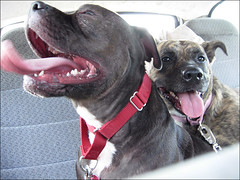Natural solutions to treat acute diarrhea in cats and dogs
 Most of the time diarrhea is not a serious issue and will pass in a day or two. Often times with dogs it is due to eating something they shouldn’t. Cats are more prone to have transient diarrhea from stress. For information on chronic diarrhea see Chronic Diarrhea in Dogs – Herbs and Diet to the Rescue.
Most of the time diarrhea is not a serious issue and will pass in a day or two. Often times with dogs it is due to eating something they shouldn’t. Cats are more prone to have transient diarrhea from stress. For information on chronic diarrhea see Chronic Diarrhea in Dogs – Herbs and Diet to the Rescue.
There are some simple days to treat acute diarrhea in cats and dogs but before we talk about those, some symptoms that you should take seriously.
Reasons to see a vet immediately
- Very young puppy or kitten – these little guys can quickly become dehydrated and are more prone to parvovirus and panleukopenia that can be deadly.
- Extreme lethargy – this may be a sign of more serious disease.
- Vomiting with the diarrhea – an animal can quickly become dehydrated if they are losing fluids from both ends. If they vomit once or twice, are not lethargic and are eating then you may be able to wait but if vomiting is extensive or continues for more than a day see your vet.
- Blood in the feces or black stool – can be a sign of bleeding ulcers in the stomach or of a disease called Hemorrhagic Gastroenteritis or HGE. Both can be deadly. It is common to have a small amount of red blood with diarrhea but it should not be excessive. With HGE you often have more blood than feces.
- Diarrhea with neurologic symptoms such as shaking, problems walking or seizures. This could be a sign of toxin exposure or more serious disease.
So what do you do if your dog or cat has diarrhea (this is assuming they are eating well)
- Pumpkin – One of the most simple and easiest ways to treat diarrhea. Not only does it treat diarrhea but also helps with constipation. I use 1 teaspoon with meals for cats and small dog and 1 tablespoon or more for medium to large dogs. Most animals really like the taste of it.
- Stop Diarrhea formula (Zhi Xie San) – This is my favorite herbal formula for diarrhea,see What I made today – Stop Diarrhea Formula If you have a holistic vet you work with they may be able to make it. Ask them! If not Zhi Xie San is also available for purchase in my etsy shop Kingdom of Basil
- Slippery elm – can be a great coating agent to both the stomach and intestine. Animals’ Apawthecary Phytomucil
is a great product that includes slippery elm and other herbs that coat and sooth the gi tract. Sweet and easy to give it is easiest for cats and many dogs. Slippery elm alone can be bought in powder and cooked with a little water to make a syrup or given in capsules to larger dogs.
- Bland diet for dogs. Many times this guys need something easy on their digestive tract. Rice, chicken broth and chicken breast cooked together in a pot makes a nice bland diet. I usually feed for two to three days and then slowly work them back to normal food. Cats usually are picky when it comes to food and will often not eat a bland diet.
- Rule out parasites by taking a fecal sample to your veterinarian. This is especially important with dogs and young kittens. Older cats are less likely to have parasites especially if they are mostly indoors.
- Fasting is an option but should only be done if your animal is an adult, not geriatric, and does not have other health issues. I always provide water. If you fast do it for 24 hours and then move into a bland diet. You can also do a broth fast where chicken broth is offered but no other solid food
- Probiotics – can help to rebalance the bacterial flora of the intestinal tract. There are many animal products out there but human probiotics are also fine to give. I often recommend opening the capsules and sprinkling on your animal’s food. The best probiotics are found refrigerated at your local health food or supplement store. One of my favorite refrigerated ones is Udo’s – most health stores have it. If you order it online make sure it comes cold packed. Two of my favorite non-refrigerated ones that you can order online are Vetri-Mega Probiotic
and Thorne Bacillus CoagulansVET
- Bach Rescue Remedy
or other ways to manage stress – some animals get diarrhea from stress. In this case stress is the root cause and needs to be addressed. A little rescue remedy in the water can help. There are other stress management techniques including Feliway for cats
and DAP for Dogs
which are pheromone sprays that reduce anxiety, Thundershirts
for dogs and behavior management.
 If your animal’s diarrhea is not getting better within 24-48 hours or if they get worse during that time see your animal’s veterinarian. Most diarrhea is transient and quickly passes but it could be part of a larger health problem. Some animals have chronic diseases that cause diarrhea such as pancreatitis, liver dysfunction, and inflammatory bowel disease. Many of these suggestions can help with such illnesses but there are other ways that often work better and have longer lasting results.
If your animal’s diarrhea is not getting better within 24-48 hours or if they get worse during that time see your animal’s veterinarian. Most diarrhea is transient and quickly passes but it could be part of a larger health problem. Some animals have chronic diseases that cause diarrhea such as pancreatitis, liver dysfunction, and inflammatory bowel disease. Many of these suggestions can help with such illnesses but there are other ways that often work better and have longer lasting results.
This article does not take the place of veterinary care. If you are animal is sick see your veterinarian.


May 13th, 2012 at 11:08 am
Great article. I was hoping you would share a couple of human Probiotics you like. I have a 13LBS Shih-Tzu and it makes me a bit nervous to give him the wrong (human) dose. I was under the impression that opening a capsule and sprinkling the powder could cause gastrointestinal problems.
Thank you :o)
May 13th, 2012 at 12:16 pm
Hi Michelle,
I’ve never had an issue with the human ones – there is a huge range of dosage. For the little guys I usually say use about 1/2 a capsule if you do the human ones. I added a couple of my favorites to the article above. One of my favorites of the human products is Udo’s – they make pet products also but not a probiotic. Two of my favorite vet products are from Vet-Science Labs and Thorne, they store at room temp.